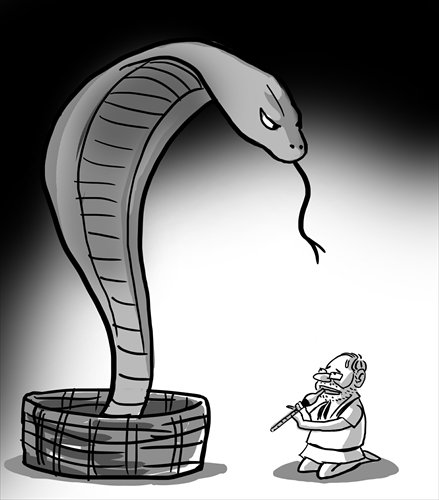Post-triumph, Modi faces grim realities

Illustration: Liu Rui/GT
After months of intense campaigns, the Indian electorate finally delivered a landmark verdict. This watershed general election saw the Congress party getting completely mauled and plunging to its lowest ever performance in electoral history. Many regional satraps who flourished through caste, class or ethnic appeal were decimated in their strongholds.
The historic verdict offers the opposition prime ministerial candidate Narendra Modi an unprecedented opportunity. A truly transformative election that was fought on the issues of leadership, economy and governance has raised unprecedented hope and expectations among ordinary Indians. This is a verdict for change and Modi represents the face of that change. The Indian people have given him a full majority for his own party, a feat no other political parties have achieved in the last 30 years.
Yet as a voice of change, Modi faces a series of challenges to deliver on the promises made during the course of a brilliant campaign.
A massive mandate brings with it massive expectations. Millions of Indians expect Modi to transform the country, especially its ailing economy, and to revive the "India story." But Modi inherits a low growth economy with high inflation tendencies where business sentiments and market expectations are at their lowest. While markets have been enthused at his massive victory, a long and torturous road to economic recovery awaits him.
Besides, constraints from labor laws, land acquisition woes, infrastructure, bad debt, and regulatory hassles from forest to environment clearances would take months and years to sort out. Modi also has to hit the ground running as millions of young people enter the job market every year. He has a responsibility to arrest the country's imminent demographic disaster.
However, everything depends on how Modi does his federal math. Most of the actions take place at the state level and the center must play the role of a facilitator. To play an effective role and clear the cobwebs of procedural and bureaucratic barriers on labor, land acquisition, regulatory clearances and creation of a pro-market environment, he needs the support of the states.
Despite an emphatic win in the Lok Sabha (lower house), Modi does not have the required numbers in the Rajya Sabha (upper house). He has to bring regional players together to work the magic. With his authoritarian style and lack of federal or national level experience, this may be a hurdle.
Another critical challenge that Modi has to address is on the frontier of governance. India's biggest Achilles heel is its mammoth and corrupt bureaucracy. While the country's economy has been liberalized and the Licence Raj is mostly past, the bureaucracy still wields huge powers that are often seen as barriers to growth-enhancing measures.
While Modi may find it easier to overhaul the administrative apparatus, he also faces the challenges of dealing with independent institutions such as the comptroller and auditor general and the all-powerful judiciary. Much of the fate of the last government was determined by these institutions.
On another frontier, Modi has been accused by opponents of favoring crony capitalism and being liberally funded by big business. One of the most talked about public policy debate in India in recent time has been the issue of cozy relations between business and politics. This was vividly displayed through the lens of many mega-scams such as spectrum and coal allocations. Therefore, Modi faces maximum scrutiny on policies that can create a business environment and ensure private sector's participation in the economy.
But his bigger challenge would be with regard to preserving and advancing the idea of India. Modi has a minority problem.
His role in the 2002 Gujarat riots still makes him a fearful personality among Muslims, the largest minority group in India.
No other Indian prime minister before him faced the kind of global and national scrutiny that Modi was subjected to. So, it will be important how and to what degree he reaches out to minorities, especially those who didn't vote for him, and make them feel secure in building an inclusive India.
The author is a senior fellow at the Observer Research Foundation, New Delhi. opinion@globaltimes.com.cn